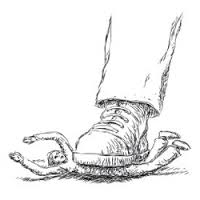记忆方法
1. 被压者带有一种抵触情绪,就是说一种不情愿、带有抵触性的被压制。
中文词源
oppress 压制,压迫
op-,在上,表强调,press,压,按,逼迫。引申词义压制,压迫。
英语词源
- oppress
-
oppress: see press
- oppress (v.)
- mid-14c., from Old French opresser "oppress, afflict; torment, smother" (13c.), from Medieval Latin oppressare, frequentative of Latin opprimere "press against, press together, press down;" figuratively "crush, put down, subdue, prosecute relentlessly" (in Late Latin "to rape"), from ob "against" (see ob-) + premere "to press, push" (see press (v.1)).
It is the due [external] restraint and not the moderation of rulers that constitutes a state of liberty; as the power to oppress, though never exercised, does a state of slavery. [St. George Tucker, "View of the Constitution of the United States," 1803]
Related: Oppressed; oppressing.
权威例句
- 1. He states uncompromisingly that he is opposed to any practices which oppress animals.
- 他坚决声明反对任何虐待动物的行为。
- 2. The imperialists exploit and oppress all the peoples of the world.
- 帝国主义者剥削和压迫全世界人民.
- 3. A good ruler will not oppress the poor.
- 好的统治者不会压迫贫民.
- 4. This is a dream in which things are all loose and they oppress.
- 在梦中,一切事都散漫着,都压着我,但这不过是一个梦呀.
- 5. They crush your people, O LORD; they oppress your inheritance.
- 耶和华阿, 他们强压你的百姓, 苦害你的产业.
